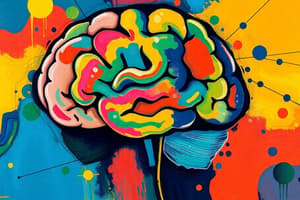Podcast
Questions and Answers
What is the primary function of the human mind?
What is the primary function of the human mind?
- To store memories
- To produce hormones
- To regulate heartbeat
- To process information from the senses (correct)
Where does the brain receive sensory data from?
Where does the brain receive sensory data from?
- Autonomic regions
- Spinal cord
- Specific areas of the cerebral cortex (correct)
- Motor pathways
Which of the following is NOT a basic function of the mind?
Which of the following is NOT a basic function of the mind?
- Affecting behavior
- Influencing mood
- Affecting concentration
- Regulating heartbeat (correct)
What happens to sensory signals in the brain before being relayed out to other parts of the body?
What happens to sensory signals in the brain before being relayed out to other parts of the body?
Why is mental fitness important according to the text?
Why is mental fitness important according to the text?
Which hemisphere of the brain controls creativity and music perception?
Which hemisphere of the brain controls creativity and music perception?
What part of the brain governs emotions, drives, and motivations?
What part of the brain governs emotions, drives, and motivations?
What part of the brain matures later than the rest but plays a significant role in decision-making abilities?
What part of the brain matures later than the rest but plays a significant role in decision-making abilities?
Which mental illness involves extreme mood swings between mania and deep depressive episodes?
Which mental illness involves extreme mood swings between mania and deep depressive episodes?
What helps prevent mental degeneration related to aging according to the text?
What helps prevent mental degeneration related to aging according to the text?
Flashcards are hidden until you start studying
Study Notes
Introduction
The human mind is one of our most fascinating aspects, controlling everything from thoughts and emotions to physical actions and memories. It's a complex organ responsible for our understanding of the world around us, driving our interactions with others, and shaping who we become. This guide is designed to help you understand more about this incredible part of yourself by examining its functions, structure, development, and potential issues.
Functions
The primary function of your mind is to process information from the senses, interpret it, create meaning from it, and output a response based on those interpretations. Your brain receives sensory data such as sight, sound, touch, taste, smell, balance, and temperature through nerves leading to specific areas of the cerebral cortex called sensory regions. These signals are then sent along pathways between different parts of the brain where they undergo processing before being relayed back out to muscles, glands, organs, blood vessels, or other nerve cells via motor and autonomic pathways.
In addition to these basic functions, your mind affects your behavior, mood, and ability to concentrate. Without a healthy mind, daily activities can become difficult; thinking clearly, learning, making decisions, managing stress, and engaging in meaningful social interaction all require mental fitness.
Structure
The human brain consists of two hemispheres - the left side which controls logical thinking, mathematics, language analysis and comprehension, while the right side handles creativity, intuition, understanding patterns, spatial relationships, music perception, emotional expression, and much more. Each hemisphere has four main lobes (frontal, parietal, temporal, occipital) that control various cognitive processes including memory retention, reasoning, problem solving, and visual processing.
Connected to these lobes are clusters of neurons known as nuclei, each performing specialized tasks like generating nerve impulses, storing and retrieving information, and regulating sleep cycles. Above the stem lies the limbic system, which governs emotions, drives, and motivations. Atop the whole structure sits the neocortex, dividing into colored layers for vision, hearing, touch, motor planning, and spatial awareness.
Development
From birth until early adulthood, the brain experiences significant growth phases fueled by new connections between billions of neurons. During this period, neural circuits develop rapidly due to increased exposure to environment, learning opportunities, and interactions with caretakers. As children grow older, their minds begin to specialize in certain skills making them better problem solvers, critical thinkers, and creators.
Adolescence brings changes too, particularly in the prefrontal cortex which matures later than the rest of the brain yet plays a vital role in decision-making abilities. Continuous stimulation throughout life keeps the mind sharp, preventing degeneration related to aging. Thus, maintaining good mental health means keeping active mentally and physically, ensuring ample rest, eating well, staying connected socially, and avoiding unnecessary stress.
Possible Issues
Mental illnesses like anxiety disorders, depression, bipolar disorder, schizophrenia or autism spectrum conditions affect millions worldwide. For example, anxiety arises when fear becomes chronic and excessive, often triggering panic attacks. Depression results from prolonged feelings of sadness and hopelessness. Bipolar disorder involves extreme mood swings involving mania and deep depressive episodes while Schizophrenia includes hallucinations, delusions, disorganized speech, unpredictable emotions, and unusual behaviors. Autism Spectrum Disorders involve difficulties with communication, repetitive behavior, and limited interests.
Such challenges may arise from genetic factors, environmental influences, trauma, or drug abuse among many reasons. Fortunately, there are treatments available depending upon the condition such as medication, therapy, group support sessions, and lifestyle adjustments that can help manage symptoms and improve quality of life.
Understanding how your mind works and taking steps towards staying mentally fit can enhance the overall functioning of both body and spirit. Remember, mindfulness practices have been shown to increase resilience, reduce negative emotions, promote empathy, enhance focus, and even rewire the brain for clearer thinking. So take time to nurture your mind, just like any other aspect of your wellbeing.
Studying That Suits You
Use AI to generate personalized quizzes and flashcards to suit your learning preferences.




